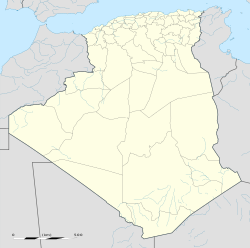Igilgili

Igilgivi was located between Icosium (Algiers) and Hippo Regius (Annaba)
|
|
| Location | Algeria |
|---|---|
| Region | Jijel Province |
| Coordinates | 36°49′00″N 5°46′00″E / 36.816667°N 5.766667°E |
Igilgili was a Roman-Berber colonia in located in present-day Jijel, Algeria.
Igilgili was initially a small Carthaginian trading port. After the defeat of Jugurtha by the Romans and allies in 105 BC, the Phoenician city came under the rule of the Roman Empire and turned into a Roman colony under Augustus in 33 BC. From the beginning, its residents enjoyed full Roman citizenship. Once the Romans occupied the whole of North Africa, the city of Igilgili was administratively attached to the Roman province of Mauretania Caesariensis and later to the one of Mauretania Setifensis. In those years Igilgili grew to nearly 6,000 inhabitants and was very rich, with commerce to Italy and Spain.
The site (of Igilgili) is on a low peninsula and a small coastal plain enclosed by a ring of hills, about half-way between Bône and Algiers. The Roman colony, founded by Augustus (Plin. HN 5.21), is mentioned by Ptolemy (4.2.2), in the Antonine Itinerary, the Peutinger Table, and in the Ravenna Geographer. It was a fairly important port until the Byzantine period. Six roads went out from it...The remains of town walls (which have now disappeared) belonged to the Roman period. An aqueduct comes from the S. To the SE of the knoll of St. Ferdinand were public baths. They have produced Dionysiac and ornamental mosaics, now at the Skikda Museum (formerly Philippeville), and sculptures (a satyr's head at the Algiers Museum). Other artifacts include statuettes, lamps, and votive stelae (at the Skikda Museum and the Louvre). M. Leglay
Igilgili population and its surroundings became massively Christian in the fourth century, with the formalization of this religion under Emperor Constantine, although the first conversions date back to two centuries earlier. When emperor Valentinian I sent his magister militum Theodosius (father of Theodosius I) to attack Firmus, he landed in Igilgili in 374 AD; there Firmus tried to find a compromise with him, but Theodosius refused peace to Firmus, who had proclaimed himself emperor. With the support of the indigenous local African tribes, Firmus obliged Theodosius to a bloody and hopeless campaign in which Igilgili region was devastated for a couple of years. In the end, however, Firmus was betrayed by one of his supporters, and chose suicide over capture.
...
Wikipedia

